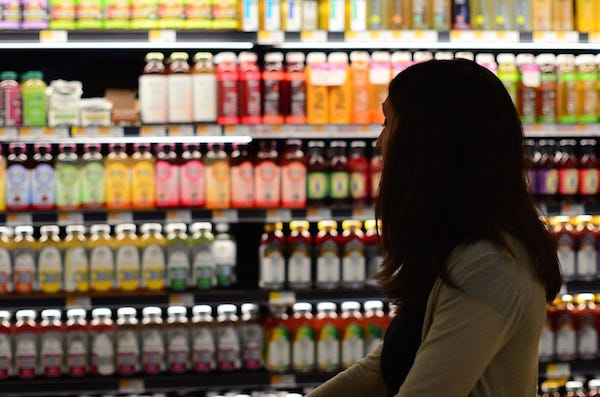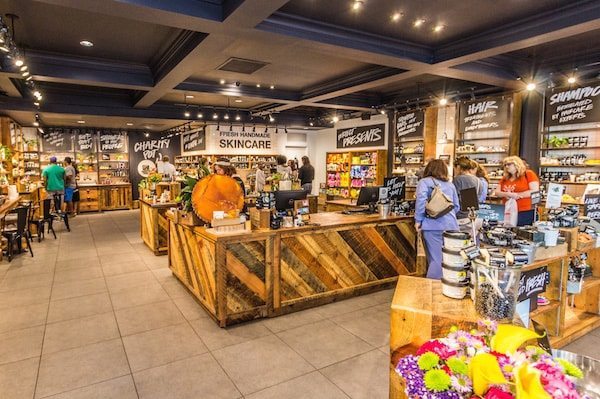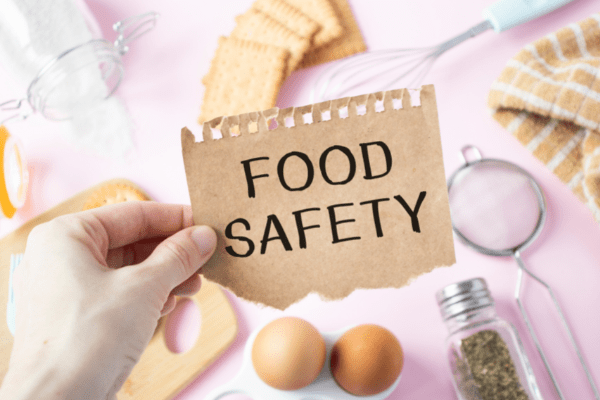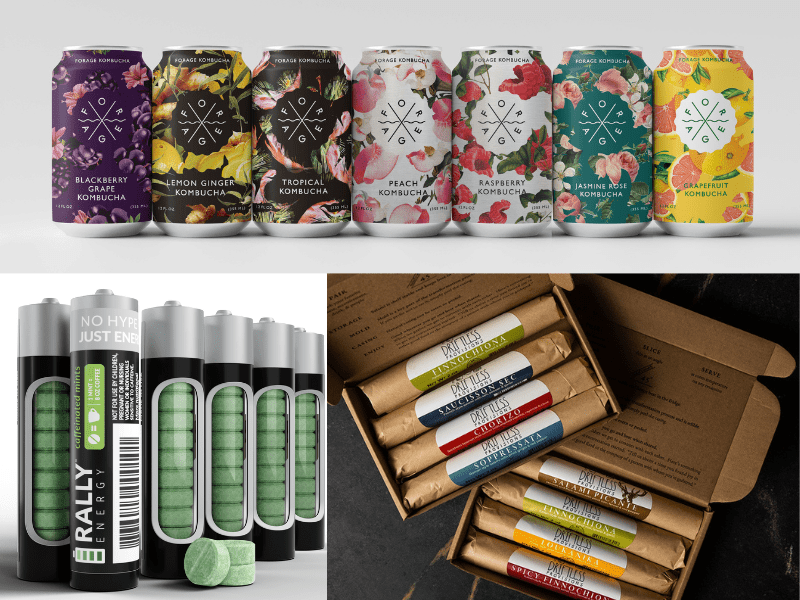Let’s face it: Food safety is not the most fun or inspiring topic to discuss. But it’s a critically important one for food and farm entrepreneurs to think about.
Consider this: Even though the U.S. has one of the safest food supplies in the world, 48 million Americans—one out of every six people—become sickened by foodborne illnesses each year. While most cases are mild, typically causing temporary abdominal pain, vomiting, or diarrhea, foodborne diseases can also lead to long-term health consequences or even be fatal. Every year, 128,000 Americans are hospitalized and 3,000 people die directly because of something they ate.
How does this happen? The vast majority of foodborne illnesses are caused by pathogenic bacteria, yeasts, viruses, molds, and other microorganisms that find their way into food somewhere along the supply chain.
Contamination can happen at any stage from farm to fork. A toxic microbe might be introduced into the food supply by livestock or poultry, or through tainted water used to irrigate crops. It could also enter during processing, such as if food comes in contact with an unsanitary surface or is handled by a worker’s unclean hands.
Alternatively, contamination might happen during distribution, due to refrigerated food lingering too long on a loading dock in the summertime, or because fresh food is transported in a truck not properly sterilized. It could occur at the retail or restaurant level too, should food be improperly handled or stored.
This is scary stuff, right?! No food or farm entrepreneur wants to be responsible for sickening even one person. Besides feeling guilty, they may be subject to incredibly costly ramifications, such as a recall, a lawsuit, or lasting consumer distrust in their brand.
As stewards of our nation’s food system, every business that handles food bears a responsibility to do everything in its power to protect consumers from harm. This includes gigantic food companies that feed millions nationwide, as well as small-scale businesses that feed only a few hundred folks locally.
Fortunately, the Food Safety Modernization Act (FSMA), signed into federal law in 2011, spells out exactly what food businesses need to do to secure the food system as tightly as possible. FSMA comes with a whole host of requirements, enforced by the FDA and USDA, that each type of enterprise must comply with. They include measures to verify suppliers, provide traceability, ensure proper processing and handling of food, and much more. This law marks a significant shift in U.S. food safety policy, moving it from reactive to proactive and preventative.
Technological advances are also making it easier for food businesses to ensure their products are safe. For example, Clean Beam’s dry, chemical-free footwear sanitizer uses pulsed ultraviolet light technology to preempt pathogens from entering food facilities. As founder Mark Cottone and marketing director Jim Rush explain in Edible-Alpha® podcast #113, the electronic system also tracks movement in a plant, allowing operators to identify breaches and potentially prevent them.
Of course, there is a monetary cost to implementing solutions such as Clean Beam’s. But the cost of sending out contaminated food could be far greater. No matter which products or services food and farm entrepreneurs implement, they must make sure food safety remains a top priority.
Mark Cottone started Clean Beam to develop a novel system for helping production facilities enhance food safety. The company’s electronic, cloud-connected footwear sanitizer, powered by DryZap! technology, helps prevent contamination and pinpoint potential problems. Mark, along with Clean Beam’s marketing director Jim Rush, discuss the importance of food safety and security, how businesses can be proactive versus reactive, and the arc of launching a tech solution in the food industry.
And now, our roundup of the best food and beverage finance news, events and resources from around the web…

Business Model Insights
- SKU View: Developing a retail channel strategy (Food Business News)
Overwhelmed by the increasing number of opportunities to sell products? Both established retail channels and alternative models (pop-ups, smart vending machines) have advantages and challenges that emerging brands must navigate. - How to hit a home run when you pitch (New Hope Network)
- 3 Tips for Promoting From Within (Entrepreneur)

Raising Capital
- 3 reasons why compliance-led sustainability can benefit producers (AgThentic Blog)
Just as manufacturers and brands bear responsibility for emissions throughout their supply chains, financial institutions are being held accountable for the climate impact of their portfolios. - Regenerative Ag Starts On the Farm: How Real Asset Players Drive Transition (Regenerative Food Systems Investment News)
- Plan for your cash needs (The Intertwine Group)

CPG/National Brands
- As consumer food spending slows and interest rates rise, brands, retailers must give them a reason to shop (FoodNavigator-USA)
Amid inflation and the threat of recession, analysts say food brands and retailers should rethink their inventory and promotional strategies to attract and maintain shoppers. - IRI pacesetters: Which new products made the biggest splash in 2021? (FoodNavigator-USA)
- 3 Keys for Marketing to Millennial Parents (The Food Institute)

Market Trends
- Consumers trust food brands, but are not loyal: study (Food Dive)
More than 70% of U.S. adults have faith in food and beverage companies, far exceeding their trust in other industries—but they don’t hesitate to switch brands should that trust be broken. - Specialty food sales swell to $175 billion (Supermarket News)
- Organic food sales continue to outpace conventional food sales (Food Business News)

Farming and AgTech
- Increasingly Heavy Farm Vehicles Are Crushing Soil Health (Modern Farmer)
Tractors and other farm machinery have grown enormously heavier over the past 60 years, now weighing as much as the heaviest dinosaurs. How are soils handling the pressure? Not well. - Dairy’s sustainability story from recycling water to fueling cars (FoodNavigator-USA)
- The Field Report: Tom Vilsack on How the USDA Can Transform the Food System (Civil Eats)

Deals/M&A
- A New Bill Aims to Ban Mergers in Ag and Food Sectors (Civil Eats)
Farmers and ranchers say now is the time to stop talking and take action to crack down on monopolies in the food system. - Recent investments round-up: Celebrities share the spotlight with natural foods (New Hope Network)
- Magic Spoon receives $85 million investment (Baking Business)

Industry Events
Virtual events:
- Edible-Alpha® MVP Series Workshop: Financial & Accounting Processes: 7/7
- IFT First: Annual Event and Expo: 7/10–7/13 (hybrid event)
- Food Finance Institute July Quarterly Trends Talk: 7/11
- Edible-Alpha® Immersion Training: Managing Uncertainty: Scenario Planning: 9/19–9/29
- FFI October Quarterly Trends Talk: 10/10
- Edible-Alpha® Immersion Training: Farm Financial Management Bootcamp: 11/15
In-person events:
- IFT First: Annual Event and Expo: 7/10–7/13 in Chicago, IL
- Organic Produce Summit: 7/13–7/14 in Monterey, CA
- Soil Health Academy School Regenerative Farming and Ranching: 7/18–7/20 in Redwood Falls, MN
- American Cheese Society Annual Conference: 7/20–7/23 in Portland, OR
- MOSES Organic Field Day: Crop Rotations on Large-Scale Organic Farm: 7/21 in Madison, SD
- Rodale Institute Organic Field Day: 7/22 in Kutztown, PA
- Digital Food & Beverage: 7/25–7/26 in Austin, TX
- Chicken Marketing Summit: 7/25–7/27 in Braselton, GA
- International Fresh Produce Association The Foodservice Conference: 7/28–7/29 in Monterey, CA
- Minnesota Farmfest: 8/2–8/4 in Redwood County, MN
- Soil Health Academy School: Increasing Profitability of Corn & Soybean Farms Through Diversity: 8/9–8/11 in Waverly, KS
- Dakotafest: 8/1–8/18 in Mitchell, SD
- National Pizza & Pasta Show: 8/23–8/25 in Rosemont, IL
- Farm Progress Show: 8/30–9/1 in Boone, IA
- Soil Health Academy School: Increased Profits Through Stacked Enterprises & Direct Marketing: 8/30–9/1 in Bismarck, ND
- Food Automation and Manufacturing Symposium and Expo: 9/11–9/14 in Miami, FL
- Americas Food & Beverage Show: 9/12–9/13 in Miami, FL
- Midwest Mechanical Weed Control Field Day: 9/14 in Benton Harbor, MI
- International Baking Industry Exposition: 9/17–9/21 in Las Vegas, NV
- Soil Health Academy School: Transformational Dairying: 9/26–9/28 in Kinzers, PA
- Natural Products Expo East: 9/28–10/1 in Philadelphia, PA
- World Dairy Expo: 10/2–10/7 in Madison, WI
- Regenerative Food Systems Investment Forum: 10/12–10/13


